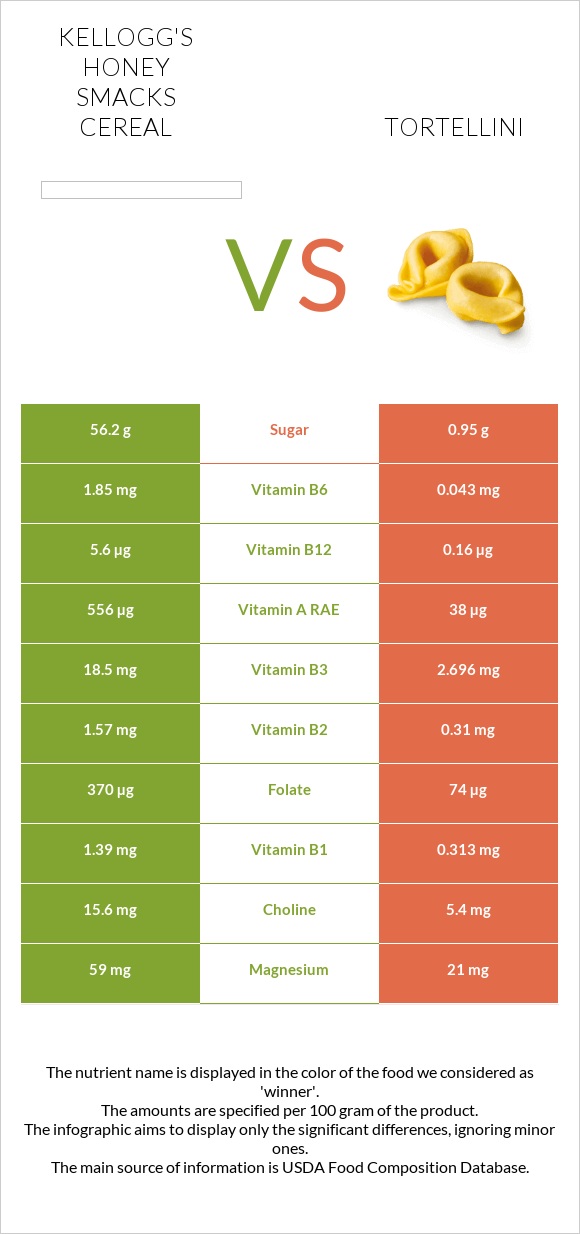Kellogg's Honey Smacks Cereal vs. Tortellini — In-Depth Nutrition Comparison
Compare
Important differences between kellogg's Honey Smacks Cereal and tortellini
- Kellogg's Honey Smacks Cereal has more vitamin B12, vitamin B6, vitamin B3, vitamin B2, vitamin B1, folate, vitamin A, vitamin D, and vitamin C than tortellini.
- Kellogg's Honey Smacks Cereal's daily need coverage for vitamin B12 is 227% more.
- Kellogg's Honey Smacks Cereal contains less saturated fat.
- Kellogg's Honey Smacks Cereal has a higher glycemic index. The glycemic index of kellogg's Honey Smacks Cereal is 71, while the glycemic index of tortellini is 60.
The food varieties used in the comparison are Cereals ready-to-eat, KELLOGG, KELLOGG'S HONEY SMACKS and Tortellini, pasta with cheese filling, fresh-refrigerated, as purchased.
Infographic

Infographic link
Mineral Comparison
Mineral comparison score is based on the number of minerals by which one or the other food is richer. The "coverage" charts below show how much of the daily needs can be covered by 300 grams of the food.
| Contains more MagnesiumMagnesium | +181% |
| Contains more PotassiumPotassium | +105.6% |
| Contains more CopperCopper | +143.8% |
| Contains more ZincZinc | +66.7% |
| Contains less SodiumSodium | -65% |
| Contains more ManganeseManganese | +∞% |
| Contains more SeleniumSelenium | +21.8% |
| Contains more CalciumCalcium | +985.7% |
Vitamin Comparison
Vitamin comparison score is based on the number of vitamins by which one or the other food is richer. The "coverage" charts below show how much of the daily needs can be covered by 300 grams of the food.
| Contains more Vitamin CVitamin C | +∞% |
| Contains more Vitamin AVitamin A | +1363.2% |
| Contains more Vitamin EVitamin E | +156.3% |
| Contains more Vitamin DVitamin D | +∞% |
| Contains more Vitamin B1Vitamin B1 | +344.1% |
| Contains more Vitamin B2Vitamin B2 | +406.5% |
| Contains more Vitamin B3Vitamin B3 | +586.2% |
| Contains more Vitamin B6Vitamin B6 | +4202.3% |
| Contains more Vitamin B12Vitamin B12 | +3400% |
| Contains more Vitamin KVitamin K | +115.4% |
| Contains more FolateFolate | +400% |
All nutrients comparison - raw data values
| Nutrient |  |
 |
DV% diff. |
| Vitamin B12 | 5.6µg | 0.16µg | 227% |
| Vitamin B6 | 1.85mg | 0.043mg | 139% |
| Vitamin B3 | 18.5mg | 2.696mg | 99% |
| Vitamin B2 | 1.57mg | 0.31mg | 97% |
| Vitamin B1 | 1.39mg | 0.313mg | 90% |
| Manganese | 1.895mg | 82% | |
| Folate | 370µg | 74µg | 74% |
| Vitamin A | 556µg | 38µg | 58% |
| Vitamin C | 22mg | 0mg | 24% |
| Vitamin D | 148 IU | 0 IU | 19% |
| Vitamin D | 3.7µg | 0µg | 19% |
| Protein | 5.7g | 13.5g | 16% |
| Carbs | 88.5g | 47g | 14% |
| Cholesterol | 0mg | 42mg | 14% |
| Calcium | 14mg | 152mg | 14% |
| Saturated fat | 0.5g | 3.6g | 14% |
| Copper | 0.195mg | 0.08mg | 13% |
| Fiber | 5g | 1.9g | 12% |
| Sodium | 142mg | 406mg | 11% |
| Magnesium | 59mg | 21mg | 9% |
| Selenium | 29.1µg | 23.9µg | 9% |
| Fats | 2.2g | 7.23g | 8% |
| Zinc | 1.7mg | 1.02mg | 6% |
| Calories | 380kcal | 307kcal | 4% |
| Monounsaturated fat | 0.4g | 2.066g | 4% |
| Potassium | 183mg | 89mg | 3% |
| Vitamin E | 0.41mg | 0.16mg | 2% |
| Choline | 15.6mg | 5.4mg | 2% |
| Vitamin K | 2.8µg | 1.3µg | 1% |
| Net carbs | 83.5g | 45.1g | N/A |
| Iron | 1.5mg | 1.5mg | 0% |
| Sugar | 56.2g | 0.95g | N/A |
| Phosphorus | 213mg | 212mg | 0% |
| Trans fat | 0.5g | N/A | |
| Polyunsaturated fat | 0.5g | 0.461g | 0% |
| Omega-3 - DHA | 0g | 0.001g | N/A |
Macronutrient Comparison
Macronutrient breakdown side-by-side comparison
Protein:
5.7 g
Fats:
2.2 g
Carbs:
88.5 g
Water:
2.9 g
Other:
0.7 g
Protein:
13.5 g
Fats:
7.23 g
Carbs:
47 g
Water:
30.5 g
Other:
1.77 g
| Contains more CarbsCarbs | +88.3% |
| Contains more ProteinProtein | +136.8% |
| Contains more FatsFats | +228.6% |
| Contains more WaterWater | +951.7% |
| Contains more OtherOther | +152.9% |
Fat Type Comparison
Fat type breakdown side-by-side comparison
Saturated fat:
Sat. Fat
0.5 g
Monounsaturated fat:
Mono. Fat
0.4 g
Polyunsaturated fat:
Poly. Fat
0.5 g
Saturated fat:
Sat. Fat
3.6 g
Monounsaturated fat:
Mono. Fat
2.066 g
Polyunsaturated fat:
Poly. Fat
0.461 g
| Contains less Sat. FatSaturated fat | -86.1% |
| Contains more Mono. FatMonounsaturated fat | +416.5% |
~equal in
Polyunsaturated fat
~0.461g





